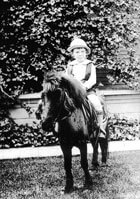John Dullaghan allows Charles Bukowski to step beyond his myths
Some artists need protection from their own reputations. Can anyone now reading Jack Kerouac’s “On The Road” or William S. Burroughs’ “Naked Lunch” have an experience uncolored by the myths of these writers’ lives—especially their addictions—and their branding as hip icons?
Like the Beats, Charles Bukowski drew heavily on his own life. He presented himself as a kind of Everyman, a punk avant la lettre, bringing poetry out of the academy and back to raw experience. This depiction—and his reliance on autobiography—covers up the amount of discipline and dedication it took Bukowski to find his voice. “Bukowski: Born Into This,” a thorough biography, delves behind the myth. It’s still a bit shallow, but it’s determined to present Bukowski as a real person, not just a drunk who occasionally hit the typewriter.
Born in Germany in 1920 to an American father and a German mother, Bukowski moved to L.A. a few years later. His adolescence was blighted by an extremely disfiguring case of acne. But he struggled hard to find his voice as a short story writer, traveling around the U.S., working blue-collar jobs, and spending all his spare time perfecting his craft.
At first, his work was universally rejected. He kept going ahead with short stories, and eventually some were published. In 1956, he nearly died of a stomach hemorrhage. After recovery, he began writing poetry, quickly making his reputation in that field.
Throughout the late 50s and the 60s, he worked at the post office until businessman-turned-publisher John Martin offered to support him if he would write full-time. Soon after receiving this offer, he turned in his first novel, “Post Office.” In his later years, Bukowski was able to live off his novels’ royalties and became a minor celebrity.
“Bukowski: Born Into This” pieces together the connections between the writer’s life and work. The film progresses through his oeuvre chronologically, tackling certain subjects only after he wrote about them. His tormented sex life and reaction to notoriety comes up in the context of his novel “Women.” Director John Dullaghan only discusses Bukowski’s childhood after bringing up “Ham On Rye.”
Bukowski may not exactly be an overexposed subject, but Dullaghan isn’t the first documentarian to take him on. (This fascination isn’t limited to filmmakers. Critic Dennis Harvey reports that the San Francisco public library system contains more books about him than by him.) Taylor Hackford and Barbet Schroeder have already made documentaries about Bukowski. Dullaghan draws on both, with Schroeder’s film supplying a vicious argument between him and his girlfriend Linda and Hackford providing anecdotes about Bukowski’s early 70s antics. With his subject 10 years dead, Dullaghan is fortunate to have such an archive of material, enough so that he lets Bukowski speak for himself most of the time. He also interviewed some of his friends, lovers, and famous fans. The footage is generally interesting, but I could have done without the obligatory praise from Bono, Tom Waits (whose early 70s persona owed a lot to Bukowski), and Sean Penn.
For the most part, viewing Bukowski’s biography through the prism of his books succeeds. He may have been equally dedicated to writing and drinking, but Dullaghan emphasizes just how much effort went into honing his voice. All the same, he tends to take the writer’s view of his life at face value. In the film’s first shot, Bukowski is holding a wine bottle in one hand and asking for another. Dullaghan includes a montage of him drinking, but never really explores how his alcoholism affected him. (He never went on the wagon, but after a 1988 bout of tuberculosis, he cut back significantly.)
There’s something to be said for not defining a man’s life by his addictions and shortcomings, but in this case, “Bukowski: Born Into This” feels superficial.
Similarly, its treatment of his attitudes towards women goes soft. The argument with Linda offers clear evidence of misogyny, while Bukowski maintained that his work treats men far more cruelly than women.
Dullaghan’s best tactic may be allowing room for Bukowski himself. The man was a charismatic raconteur with a surprisingly smooth voice—his recounting of his first sexual experiences is magnetic.
“Bukowski: Born Into This” doesn’t make the case for him as a great writer abstractly. It brings his poetry onscreen—literally, as Dullaghan fills the screen with words. For all its hesitations on uncomfortable subjects, the film makes Bukowski come to life.
We also publish:


































